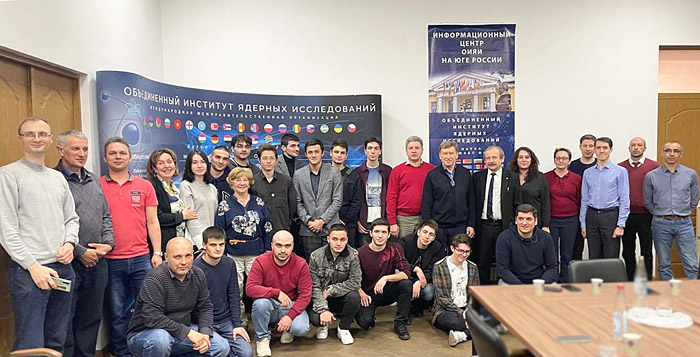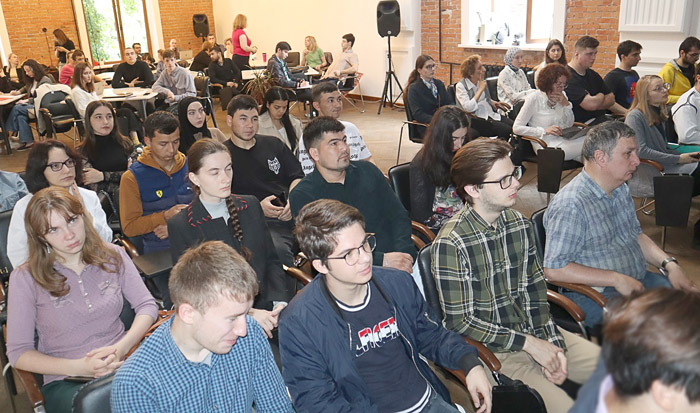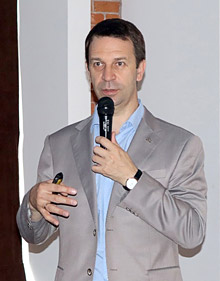
Electronic english version since 2022 |
The newspaper was founded in November 1957
| |
|
Number 26 (4674) |
JINR IT School in NOSU - 5 years of cooperation!
On 14 - 17 June, the V International Summer School "Modern information technologies for solving scientific and applied problems" was held. The School was held at the North Ossetian State University named after K.L.Khetagurov (NOSU) on the basis of the Information Centre of the Joint Institute for Nuclear Research.
Note that since 2018 JINR and North Ossetian State University have been extensively developing cooperation. On 12 October, 2018, the solemn opening of the first Information Centre of the Joint Institute for Nuclear Research was held at NOSU, aimed at ensuring the coordination of JINR cooperation with regions in southern Russia, popularizing the activities and achievements of JINR in order to attract young people to science, starting from the stage of school education. In May 2019, NOSU hosted the first IT School for young scientists "Modern IT technologies for solving scientific problems", organized jointly by JINR and NOSU.

In 2020, a computing cluster was installed at the Faculty of Physics and Technology of NOSU, acquired under the mega-grant 075-15-2019-1887 and integrated into the JINR cloud infrastructure. It allowed NOSU scientists to work on research together with colleagues from the Institute and JINR Member States. The cluster is focused on solving complex problems of theoretical and experimental research, including for the NICA megascience project. Within the framework of the second IT School, in addition to practical classes on the heterogeneous computing platform HybriLIT, classes were also held on the JINR cloud infrastructure (cloud.jinr.ru) that allowed to introduce to participants the work on the latest computing architectures.
The programme of the third IT School included practical classes on solving applied problems: "Machine and deep learning for radiobiology problems", "Monitoring of transboundary air pollution based on moss analysis", as well as a master class on development of mobile applications that was carried out by NOSU employee David Minasyan. Interest in this topic and the work of scientific teams allowed to publish a number of joint publications, as well as to submit an application to the RSF for the competition "Conducting fundamental scientific research and exploratory scientific research on behalf of the President of the Russian Federation" (project leader from JINR O.I.Streltsova, project leader from NOSU I.V.Tvauri).
In 2022, the first tasks of the MPD experiment were successfully completed in the NOSU cloud infrastructure. In total, about 1700 tasks were completed. The total consumed CPU time was more than 2.5 years. About 70 GB of data was generated by the NOSU cloud for the MPD collaboration. Within the framework of the 4th School, in addition to traditional lectures and classes, a workshop "Techniques of machine learning in the problems of experiments in high energy physics" was held. As part of the course, the participants learned how to use machine learning and Python libraries to solve the ML problem of particle identification in the MPD experiment at NICA. The problem of particle identification is the most important component of the physical analysis of data obtained in experiments. Various investigations show that due to the need to analyze an ever-increasing amount of data, the use of machine learning techniques for implementing physical analysis allows for a more efficient way to solve current algorithms.
To participate in the jubilee 5th IT-School, students and young scientists from the North Caucasian Federal University, Chechen, Adyghe Kabardino-Balkarian and Alexander Tibilov South Ossetian State Universities came to Ossetia. Having expanded the geography of the School, participants from Vladivostok and Kamchatka joined them.

Participants immersed themselves in various spectra of information technologies at lectures, round tables and master classes.
The School programme included lectures on the JINR digital ecosystem and developing information technologies for solving scientific and applied problems. Students learned about distributed computing for data processing, about the organization of databases in large scientific experiments. A separate unit of reports was dedicated to JINR's flagship projects: the participants learned how the NICA accelerator complex and the Govorun supercomputer operated. In addition, the participants of the School were told about computer calculations for the SPD detector, mathematical simulation for solving applied problems, the development of plug-ins for the JINR website and machine learning.
 JINR Director Grigory Trubnikov made a report on the JINR development strategy to the students. "Our task today here in Vladikavkaz is to enable students to be involved in major projects, to engage in great science together with JINR," Grigory Vladimirovich said.
JINR Director Grigory Trubnikov made a report on the JINR development strategy to the students. "Our task today here in Vladikavkaz is to enable students to be involved in major projects, to engage in great science together with JINR," Grigory Vladimirovich said.
The students were able to consolidate their knowledge in practice at master classes organized by the staff members of MLIT JINR on artificial intelligence, calculations for projects in the field of theoretical physics and the use of automated systems in applied problems. Alexander Uzhinsky taught the children classification and object detection in images using neural networks at a master class on machine learning. Nikita Balashov and Igor Pelevanyuk spoke about modern virtualization techniques and software development technologies. Maxim Zuev and Yuri Butenko, together with BLTP employee Ilkhom Rakhmonov, held a practical lesson on techniques and tools for organizing calculations and scientific visualization in the Python programming language.
At the master class by Anna Lyubimova (Dubna State University) "National technologies of GIS-Integro for solving applied problems", the participants learned about modern geographic information systems and technologies. The participants of the School showed great interest in the topic of the master class on virtual and augmented reality that was held by Head of the Engineering modeling studio of the Dubna University Lev Teryaev.
As part of the traditional special programme of the School, a round table "Training of personnel for the digital economy" was held. Scientific Leader of the Institute of ACS at Dubna University Evgenia Cheremisina and Director of the School of Big Data Analytics Snezhana Potemkina discussed with colleagues, including from FEFU and KamSU, the issues of networking universities with scientific and technological organizations.
The practical result of the cooperation between NOSU and JINR included the papers of students of the North Ossetian University on the topics of the Institute's activities that were carried out under the joint supervision of JINR scientists and NOSU specialists. Graduation, fourth-year undergraduate students and third-year students presented at the School papers in the field of theoretical physics (Mathematical simulation of hybrid Josephson structures consisting of superconductors and magnets), information technologies (EventIndex: RestAPI development, CMS WordPress plugin development, Plant disease recognition), as well as reports on participation in the NICA project, in particular, in the SPD experiment (Develoment of a test programme for calculating trilinear interpolation used in the service of descriptions of the magnetic field in the SPD facility of the NICA collider). In addition, Alan Gazzaev presented the project "Voice neural network assistant for business" that will be integrated into the JINR Digital Ecosystem.
At the end of the School, the organizers awarded prizes to the brightest students that were extensively involved in learning, asked the most interesting questions and proved to be active participants in practical classes.
It is impossible not to note the special contribution to the organization of the IT-School by the organizing committee. Thanks to the support and consideration to the events from JINR Directorate and personally Grigory Vladimirovich Trubnikov, as well as the NOSU Rectorate and personally Alan Uruzmagovich Ogoev, talented students from North Ossetia and other regions of Russia can study and take part in major international projects and touch great science.
Vladimir Korenkov,
Andrey Nechaevsky